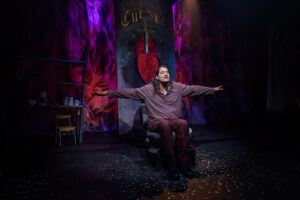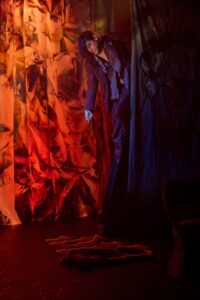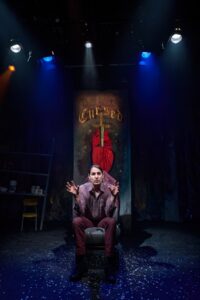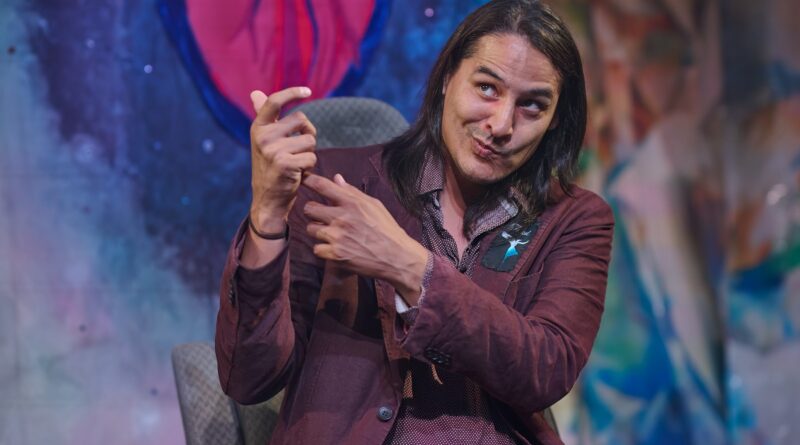(As I watched Cliff Cardinal’s latest show) A Terrible Uncertainty (overcame me)

I saw Cliff Cardinal’s latest one-man show (Everyone I love has) A Terrible Fate (befall them) the other night. I don’t quite know what to make of it.
Cardinal is the award-winning Indigenous poet, playwright and actor who is known for dark, difficult plays like Stitch, Huff and Too Good To Be True. He may be best-known as the master stand-up comedian whose searing, smiling The Land Acknowledgement, or As You Like It dismantled and refashioned the most widespread effect of the Truth and Reconciliation Commission of Canada. He’s a trickster, a satirist and a surgeon who trains his intense gaze and scalpel-like, poetic language on the injustice, absurdity and existential challenges of modern life.
The ostensible premise of (Everyone I love has) A Terrible Fate (befall them) is summarized in its title. A seated Cardinal repeats the phrase several times in the first few minutes of show, while his character earnestly unspools the childhood events – moments of connection with others succeeded by their graphic deaths — that are its first proof points.
His speech is rapid. His tone is urgent. His engagement with the audience, whom he faces directly from the center of the VideoCabaret stage, is immediate and intense. For a moment, I wonder if this is autobiography.
But each story includes an absurd extra turn of the knife: one too many eyebrow-raising details or an especially sardonic word choice, deadpanned with that direct Cardinal gaze. So I’m persuaded that, no, Cardinal is playing a character. The character’s name, I discover, is Robert.

But to what use is this character being put? Director and dramaturg Karin Randoja opens the space for this question to preoccupy and ultimately confound me. As the play opens, the lanky Cardinal is seated in the middle of three chairs on the stage: a recliner beneath a stylized Cursed sign. To the left is a Love chair, and to the right a Fate chair. (At one point, a tiny child’s chair will also be pulled into service, maybe – just maybe – suggesting that one prosaic physical location is a nexus for all three ideas in Richard’s life).
This stage geography visualizes the play’s central conceit: Robert feels cursed.
Is he the source of the terrible fates befalling those with whom he forms a connection? As he explores this question, he alternately sits up, slouches, or lies back in his recliner, while questioning, reflecting on, conjuring and re-living moments.
At key times, he shifts to the other chairs. And all the while, he is a verbal locomotive hurtling down a talk track filled with hairpin turns. He hopes that we dislike him enough to make it through the show alive . . . yet he talks, talks, talks so we can enter into his experience.
That experience – like those initial childhood deaths – is emotionally raw and vital, yet wrapped in absurdist cloth shot with disorienting, magic-realism specificity. We hear a lot about apocalyptic asteroid strikes. Robert attends a support group led by an endangered White Indian Rhinoceros. At the group, he both forms and (given his fear) does not form a relationship with an EMS. He seeks his transient mother with the aid of hockey card divination that is anchored by the delicious non-sequitur of the Daryl Strawberry card (yup that Daryl Strawberry).
Robert’s monologues (and those of the other characters Cardinal steps into at moments) zig from jagged realism to psychedelic fever dream to full-blown psychodrama.
Are we the source of the calamities of others? Or are we bystanders with inflated egos?
Are the people we seek actually right there in front of us, if we can only shed our blinkers?
Dare we . . . get over ourselves and hope?
I don’t know.

The Land Acknowledgement was vast in scope but laser-focused on dismantling the pretence and self-satisfaction of the formula land acknowledgement. It challenged white audiences, with smiling candour, to replace it with something lived, honest and true – and necessarily difficult.
By contrast, (Everyone I love has) A Terrible Fate (befall them) is a swirling, uncertain, mischievous and psychedelic head trip. The copious humour is not openhearted, tough truth-telling revelation: it’s razorblade nicks of uncertainty, stabs of revelation, and twisting thrusts of disorientation. I was mesmerized, and I feel like I have the cuts and bruises to prove it. But I’m really not sure what I saw or how to take it.
(As I watched this show) a terrible uncertainty (overcame me).
It’s still with me.
(Everyone I love has) A Terrible Fate (befall them) has been extended until November 4, 2023. Visit videocab.com for audience advisory and to reserve tickets online.
© Scott Sneddon, Sesayarts Magazine, 2023
About The Author
Scott Sneddon
Scott Sneddon is Senior Editor on SesayArts Magazine, where he is also a critic and contributor.
Visit About Us > Meet the Team to read Scott’s full bio …



